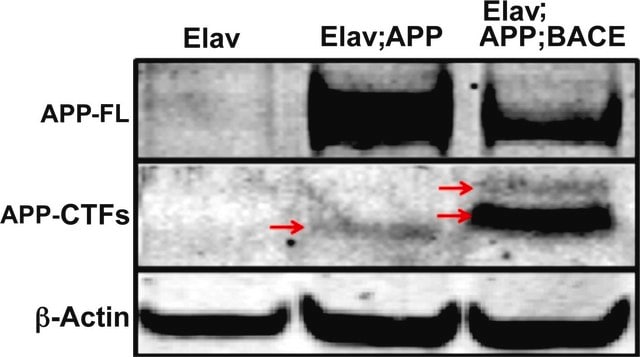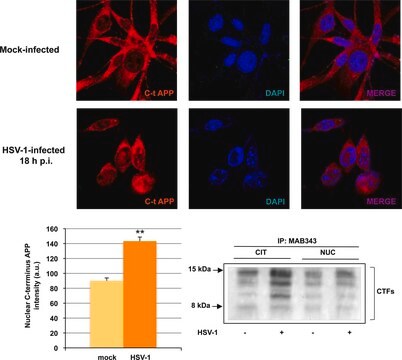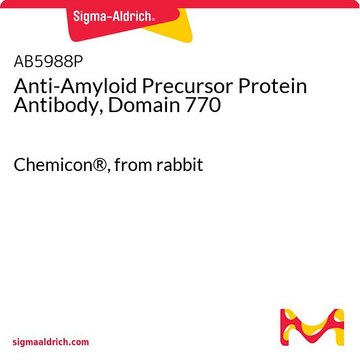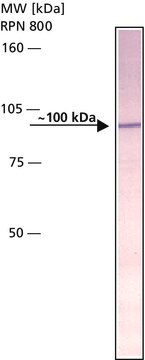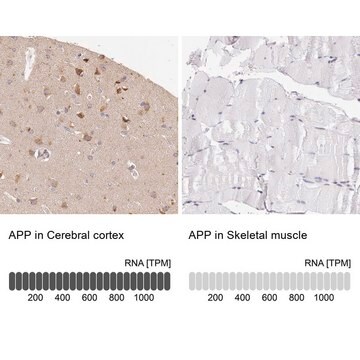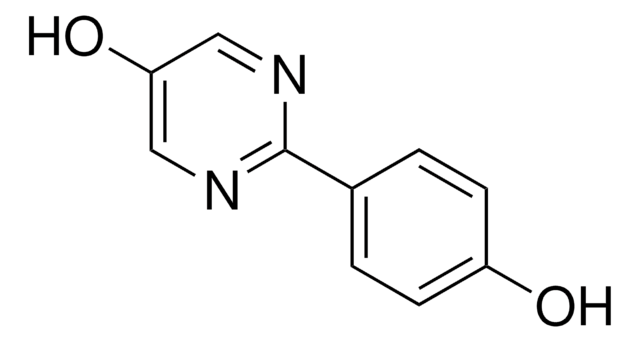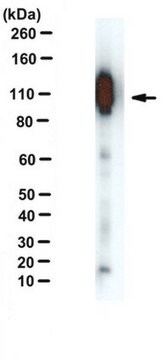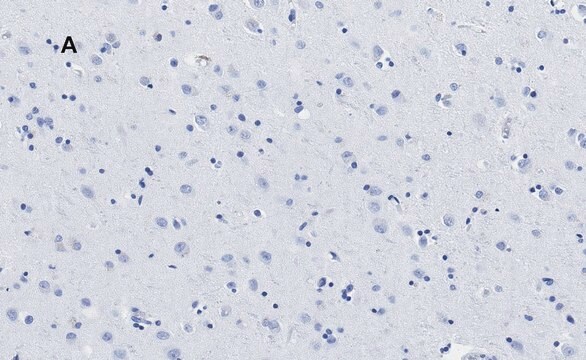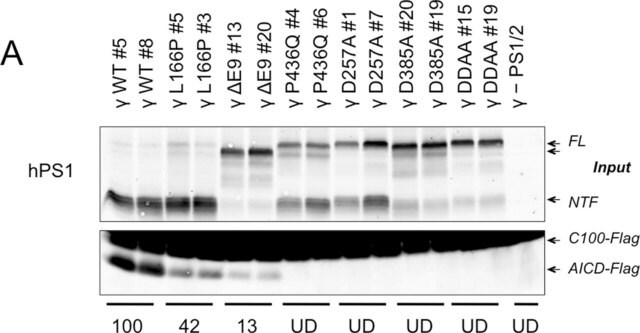MAB343-C
Anti-APP Antibody, CT, clone 2.F2.19B4, Ascites Free
clone 2.F2.19B4, from mouse
同義詞:
Amyloid beta A4 protein, ABPP, Alzheimer disease amyloid protein, Amyloid precursor protein, APP, APPI, Cerebral vascular amyloid peptide, CVAP, PN-II, PreA4, Protease nexin-II
登入查看組織和合約定價
全部照片(1)
About This Item
分類程式碼代碼:
12352203
eCl@ss:
32160702
NACRES:
NA.41
推薦產品
生物源
mouse
品質等級
抗體表格
purified immunoglobulin
抗體產品種類
primary antibodies
無性繁殖
2.F2.19B4, monoclonal
物種活性
human, mouse
技術
affinity binding assay: suitable
immunocytochemistry: suitable
immunofluorescence: suitable
immunohistochemistry: suitable (paraffin)
immunoprecipitation (IP): suitable
western blot: suitable
同型
IgG1κ
NCBI登錄號
UniProt登錄號
運輸包裝
wet ice
目標翻譯後修改
unmodified
基因資訊
human ... APP(351)
一般說明
Amyloid beta A4 protein (UniProt P05067; also known as ABPP, Alzheimer disease amyloid protein, Amyloid precursor protein, APP, APPI, Cerebral vascular amyloid peptide, CVAP, PN-II, PreA4, Protease nexin-II) is encoded by the APP (also known as A4, AD1) gene (Gene ID 351) in human. Amyloid precursor protein (APP) is initially produced with a signal peptide sequence (a.a. 1-17), the removal of which yields the mature protein with a large extracellular portion (a.a. 18-699), followed by a transmembrane segment (a.a. 700-723) and a cytoplasmic (a.a. 724-770) tail. APP can be further processed by the α-, β-, and γ-secretases in two alternative processing pathways. In the non-amyloidogenic pathway, APP is first cleaved by the plasma membrane-localized α-secretase to generate an N-terminal extracellular sAPPα fragment (a.a. 18-687) and a membrane-bound C-terminal fragment C83 (CTFα), which can be further cleaved by γ-secretase to produce a non-toxic small peptide p3 and a cytoplasmic APP intracellular domain (AICD). In the amyloidogenic pathway, APP undergoes β-cleavage in BACE-1 (β-site APP-cleaving enzyme)-enriched endosomes to generate an N-terminal extracellular sAPPβ fragment (a.a. 18-671) and a membrane-bound C-terminal fragment C99 (CTFβ). Subsequent cleavage of C99 by γ-secretase releases the amyloid β peptides, Aβ1-42 (672-713) & Aβ1-40 (672-711), and AICD. Aβ accumulation in the cortical and hippocampal regions of the brain is a major pathological feature of Alzheimer′s disease (AD). Aβ Ser8 phosphorylation is shown to promote Aβ aggregation into oligomeric and fibrillar assemblies and to prevent Aβ proteolytic clearance by certain proteases.
特異性
Clone 2.F2.19B4, also known as the Jonas antibody, regcognizes a C-terminal epitope present in 10 of the 11 human spliced isoforms reported by UniProt (P05067), with APP305 being the only spliced isoform lacking the targeted epitope. Clone 2.F2.19B4 recognizes full-length APP, the APP C-terminal fragments (CTFs) produced by α- and β-secretase cleavage, and the APP intracellular domain (AICD) generated by γ-secretase cleavage, but not the sAPPα or sAPPβ fragment. Epitope has been mapped to APP770 a.a. 732-751, which is equivalent to APP695 a.a. 657-676 (Van Vickle, G.D., et al. (2007). Biochemistry. 46(36):10317-10327).
免疫原
APP C-terminal 53-a.a. fragment.
Epitope: APP770 a.a. 732-751 (APP695 a.a. 657-676).
應用
Immunocytochemistry Analysis: A representative lot detected a greatly enhanced nuclear APP immunoreactivity due to an upregulated AICD generation and nuclear localization in HSV-1-infected SH-SY5Y cells by fluorescent immunocytochemistry (De Chiara, G., et al. (2010). PLoS One. 5(11):e13989).
Immunocytochemistry Analysis: A representative lot immunostained neural progenitor cells (NPCs) isolated from the lateral ventricles of E14 mouse brain by fluorescent immunocytochemistry (Ma, Q.H., et al. (2008). Nat. Cell Biol. 10(3):283-294).
Immunoprecipitation Analysis: A representative lot immunoprecipitated APP and cleaved APP C-terminal fragments from uninfected and HSV-1-infected SH-SY5Y cells (De Chiara, G., et al. (2010). PLoS One. 5(11):e13989).
Western Blotting Analysis: A representative lot detected APP and cleaved APP C-terminal fragments in lysates and APP immunoprecipitates from uninfected and HSV-1-infected SH-SY5Y cells (De Chiara, G., et al. (2010). PLoS One. 5(11):e13989).
Western Blotting Analysis: Representative lots detected the stably expressed full-length human APP695 in HEK293-derived BA-3 cells (Hwang, E.M., et al. (2008). Bioorg. Med. Chem. 16(14):6669-6674; Yeon, S.W., et al. (2007). Peptides. 28(4):838-844).
Immunofluorescence Analysis: A representative lot immunostained the walls of the lateral ventricles in E14 mouse brain tissue sections by fluorescent immunohistochemistry (Ma, Q.H., et al. (2008). Nat. Cell Biol. 10(3):283-294).
Affinity Binding Assay Analysis: A representative lot captured the synthetic peptide representing APP770 a.a. 732-751 or APP695 a.a. 657-676 (Van Vickle, G.D., et al. (2007). Biochemistry. 46(36):10317-10327).
Immunocytochemistry Analysis: A representative lot immunostained neural progenitor cells (NPCs) isolated from the lateral ventricles of E14 mouse brain by fluorescent immunocytochemistry (Ma, Q.H., et al. (2008). Nat. Cell Biol. 10(3):283-294).
Immunoprecipitation Analysis: A representative lot immunoprecipitated APP and cleaved APP C-terminal fragments from uninfected and HSV-1-infected SH-SY5Y cells (De Chiara, G., et al. (2010). PLoS One. 5(11):e13989).
Western Blotting Analysis: A representative lot detected APP and cleaved APP C-terminal fragments in lysates and APP immunoprecipitates from uninfected and HSV-1-infected SH-SY5Y cells (De Chiara, G., et al. (2010). PLoS One. 5(11):e13989).
Western Blotting Analysis: Representative lots detected the stably expressed full-length human APP695 in HEK293-derived BA-3 cells (Hwang, E.M., et al. (2008). Bioorg. Med. Chem. 16(14):6669-6674; Yeon, S.W., et al. (2007). Peptides. 28(4):838-844).
Immunofluorescence Analysis: A representative lot immunostained the walls of the lateral ventricles in E14 mouse brain tissue sections by fluorescent immunohistochemistry (Ma, Q.H., et al. (2008). Nat. Cell Biol. 10(3):283-294).
Affinity Binding Assay Analysis: A representative lot captured the synthetic peptide representing APP770 a.a. 732-751 or APP695 a.a. 657-676 (Van Vickle, G.D., et al. (2007). Biochemistry. 46(36):10317-10327).
Research Category
Neuroscience
Neuroscience
Research Sub Category
Neurodegenerative Diseases
Neurodegenerative Diseases
This Anti-APP Antibody, CT, clone 2.F2.19B4, Ascites Free is validated for use in Immunohistochemistry (Paraffin), Immunocytochemistry, Immunoprecipitation, Western Blotting, Immunofluorescence, Affinity Binding Assay for the detection of APP.
品質
Evaluated by Immunohistochemistry in normal and AD human brain tissue sections.
Immunohistochemistry Analysis: A 1:50 dilution from a representative lot detected APP immunoreactivity in normal human cerebral cortex and Alzheimer′s diseased (AD) brain tissue sections.
Immunohistochemistry Analysis: A 1:50 dilution from a representative lot detected APP immunoreactivity in normal human cerebral cortex and Alzheimer′s diseased (AD) brain tissue sections.
標靶描述
85.18/86.94 kDa (APP770), 75.00/76.76 kDa (L-APP677), 76.90/78.66 kDa (APP695), 77.10/78.87 kDa (L-APP696), 79.01/80.77 kDa (APP714), 81.15/82.92 kDa (L-APP733), 83.06/84.82 kDa (APP751), 83.28/85.04 kDa (L-APP752), 70.79/72.55 kDa (APP639), and 82.76/84.52 kDa (isoform 11) calcualted (full-length mature/pro-form).
外觀
Protein G purified.
Format: Purified
Purified mouse monoclonal IgG1κ antibody in buffer containing 0.1 M Tris-Glycine (pH 7.4), 150 mM NaCl with 0.05% sodium azide.
儲存和穩定性
Stable for 1 year at 2-8°C from date of receipt.
其他說明
Concentration: Please refer to lot specific datasheet.
免責聲明
Unless otherwise stated in our catalog or other company documentation accompanying the product(s), our products are intended for research use only and are not to be used for any other purpose, which includes but is not limited to, unauthorized commercial uses, in vitro diagnostic uses, ex vivo or in vivo therapeutic uses or any type of consumption or application to humans or animals.
未找到適合的產品?
試用我們的產品選擇工具.
儲存類別代碼
12 - Non Combustible Liquids
水污染物質分類(WGK)
WGK 1
閃點(°F)
Not applicable
閃點(°C)
Not applicable
分析證明 (COA)
輸入產品批次/批號來搜索 分析證明 (COA)。在產品’s標籤上找到批次和批號,寫有 ‘Lot’或‘Batch’.。
我們的科學家團隊在所有研究領域都有豐富的經驗,包括生命科學、材料科學、化學合成、色譜、分析等.
聯絡技術服務